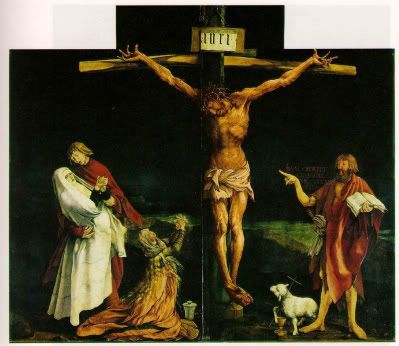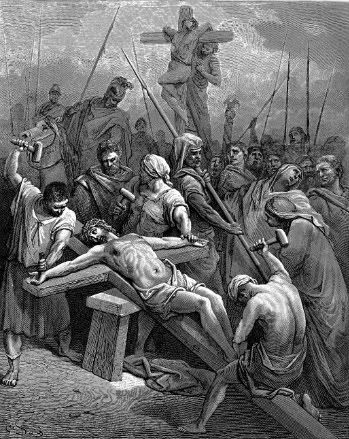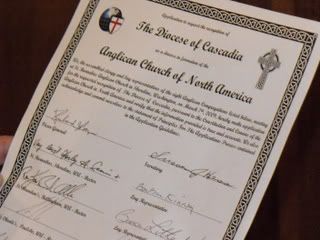H/T: Between Two Worlds
Monday, March 30, 2009
Sunday, March 29, 2009
Propitiation

he was crushed for our iniquities;
upon him was the chastisement that brought us peace,
and with his stripes we are healed.
For it was indeed fitting that we should have such a high priest, holy, innocent, unstained, separated from sinners, and exalted above the heavens. He has no need, like those high priests, to offer sacrifices daily, first for his own sins and then for those of the people, since he did this once for all when he offered up himself.
...for all have sinned and fall short of the glory of God, and are justified by his grace as a gift, through the redemption that is in Christ Jesus, whom God put forward as a propitiation by his blood, to be received by faith. This was to show God's righteousness, because in his divine forbearance he had passed over former sins. It was to show his righteousness at the present time, so that he might be just and justifier of the one who has faith in Jesus.
Still the small inward voice I hear,
That whispers all my sins forgiven;
Still the atoning blood is near,
That quenched the wrath of hostile Heaven.
-Charles Wesley
Friday, March 27, 2009
Tuesday, March 24, 2009
Sunday, March 22, 2009
Who Do You Say That I Am?

He is the radiance of the glory of God and the exact imprint of his nature, and he upholds the universe by the word of his power.
In the beginning was the Word, and the Word was with God, and the Word was God. He was in the beginning with God. All things were made through him, and without him was not any thing made that was made.
He is the image of the invisible God, the firstborn of all creation. For by him all things were created, in heaven and on earth, visible and invisible, whether thrones or dominions or rulers or authorities - all things were created through him and for him. And he is before all things, and in him all things hold together.
Thursday, March 19, 2009
Cascadia
H/T: VirtueOnline
With a blog called "Northwest Anglican" one might expect to find some writing about Anglican goings-on in the Pacific Northwest. But up until today that has not occurred. The truth is, I've never set foot in an Anglican or Episcopal church in the Pacific Northwest. The United Methodist church I was raised in would probably have been pretty indistinguishable though from a lot of Episcopal churches.
But as of today, the lack of commentary on Northwest Anglican issues ends, at least for one post. A fellow parishioner at Christ's Church, where I attend in Highland, California, alerted me today to a bit of news. I was directed to Virtue Online where David Virtue is reporting the formation of the "Diocese of Cascadia," made up of orthodox Anglican churches in the Pacific Northwest. The diocese is small right now, with only seven founding churches, all in my home-state of Washington. A bishop of the Reformed Episcopal Church will head the fledgling group as it applies for membership in the newly-formed Anglican Church in North America.
I appreciated the attitude expressed by a rector of one of the seven churches. In his sermon at the inaugural synod meeting, Kevin Allen said, "I believe we are committing to unite that which has been too long divided, to revive a great mission whose seeds were planted on these Northwest shores centuries ago, to help our church's missionary outposts reach more people for Christ so that they may know His transforming power in their lives. Today, we are committing to an Anglican reawakening and to contributing to a Christian reawakening for a revival in the Pacific Northwest."

If I ever get to return to the Pacific Northwest perhaps I will get to worship in a church in the Diocese of Cascadia. May God bless the mission of these faithful Christians.
Tuesday, March 17, 2009
Patrick
 For there is no other God, nor ever was before, nor shall be hereafter, but God the Father, unbegotten and without beginning, in whom all things began, whose are all things, as we have been taught; and his son Jesus Christ, who manifestly always existed with the Father, before the beginning of time in the Spirit with the Father, indescribably begotten before all things, and all things visible and invisible were made by him. He was made man, conquered death and was received into Heaven, to the Father who gave him all power over every name in Heaven and on Earth and in Hell, so that every tongue should confess that Jesus Christ is Lord and God, in whom we believe. And we look to his imminent coming again, the judge of the living and the dead, who will render to each according to his deeds. And he poured out his Holy Spirit on us in abundance, the gift and pledge of immortality, which makes the believers and the obedient into sons of God and co-heirs of Christ who is revealed, and we worship one God in the Trinity of holy name.
For there is no other God, nor ever was before, nor shall be hereafter, but God the Father, unbegotten and without beginning, in whom all things began, whose are all things, as we have been taught; and his son Jesus Christ, who manifestly always existed with the Father, before the beginning of time in the Spirit with the Father, indescribably begotten before all things, and all things visible and invisible were made by him. He was made man, conquered death and was received into Heaven, to the Father who gave him all power over every name in Heaven and on Earth and in Hell, so that every tongue should confess that Jesus Christ is Lord and God, in whom we believe. And we look to his imminent coming again, the judge of the living and the dead, who will render to each according to his deeds. And he poured out his Holy Spirit on us in abundance, the gift and pledge of immortality, which makes the believers and the obedient into sons of God and co-heirs of Christ who is revealed, and we worship one God in the Trinity of holy name.
-St Patrick, 387-461, from his Confession
Sunday, March 15, 2009
He That Loves His Life Shall Lose It
Though I am but dust and ashes I will speak to my Lord. If I esteem myself more than ashes, You are of a different opinion; in fact, my very sins are witnesses against me and I am unable to contradict their testimony. But if I belittle myself, think of myself as nothing, throw off all self-regard and account myself to be dust, as I truly am, then Your grace will come upon me and Your light will enter my heart, and all self-esteem, no matter how infinitesimal it be, will be drowned in my total nothingness and will disappear forever.It is within my very depths that You reveal me to myself: what I am, what I have been, and what I have become. I am nothing and I never knew it! Left to myself I am but a zero and abound with frailties, but when you turn Your face toward me I suddenly gain strength and am filled with new joy. It astounds me when I realize that You are so quick to raise me up and embrace me, who am always sinking to the bottom because of the heaviness of my sins.It is Your love that does this for me; it precedes me in all that I do, helps me in my many needs, guards me from grave dangers, and delivers me, as I most happily admit, from evils beyond all counting.By loving myself, as I should not have, I lost myself; by seeking only You and by loving You with an untarnished love, I found both You and myself, and through this love I have more fully brought myself to total nothingness.My dearest Lord, You treat me far better than I deserve and beyond all I dare hope or ask for.My God, may You be blessed for ever! Though I am unworthy to receive anything good, nevertheless, Your liberality and infinite goodness never cease doing good, even towards the ungrateful who have turned their backs upon You. Turn us again toward You so that we may be grateful, humble, and devoted to You, who alone is our salvation, our power, and our strength.Thomas à Kempis - The Imitation of Christ
Thursday, March 12, 2009
1941
At Loma Linda, School of Medicine students are required to take religion classes during our first two years. This quarter I've been taking a class called "God and Human Suffering." Various strains of thought regarding the existence of an omnipotent, good God and the reality of evil in the universe have been very interesting to me for some time so I looked forward to this class.
Our instructor, a Seventh-day Adventist physician and New Testament scholar gave us a lecture in our second to last session this week that I was impressed by. We briefly talked about the history of Christian thought on evil and he emphasized Origen and his writing Contra Celsum to give a taste of the thought of the early church on evil. Our professor, Dr. Tonstad, called this a triangular view of history with God, man and Satan all as actors. He then contrasted this with much of modern thought on evil, even thought claiming to be Christian which tends to completely de-emphasize the role of Satan in evil. In his lecture he quoted D.F. Strauss and Barth but the high point of his lecture revolved around a quote from Rudolf Bultmann, "We can no longer believe in spirits, whether good or evil." Bultmann wrote this in Germany, in 1941. In a prior lecture we had watched some of the film Shoah. It was some of the most disturbing footage on the holocaust I had ever seen. Our instructor's point was that if there was ever a time in history when man could believe in real evil, a real evil greater than ourselves in the spiritual world, it was 1941. I think he was right to point out the irony of Bultmann's statement in 1941 and his rhetoric made a strong impression on me. It is amazing that in a time like our own more people than ever before are quick to deny the existence of spiritual evil and the depraved state of man.
Sunday, March 8, 2009
God's Righteous Frown
Friday, March 6, 2009
Scripture Generates the Church
In all cases, the Church is to be judged by the Scripture,
not the Scripture by the Church.
-John Wesley
I recently read a quote from a father of the church, Irenaeus, which started me thinking about ideas like the inerrancy of Scripture and the relationship between the Scripture and the Church. Inerrancy and the way in which Scripture is authoritative are really two different subjects but I think they are strongly related, especially for Protestants. I believe in inerrancy as defined in the Chicago Statement on Biblical Inerrancy and I also believe something pretty close to "Sola Scriptura" in how I think Scripture relates to the church. It was not always so and I've done some thinking about it lately so here are some of my thoughts...
Non-Protestants like to argue that the real authority comes from the Church itself, that is the episcopacy, in the form of authoritative interpretations of Scripture, and also in assent to accepted Tradition. In this view, the Church comes before the Scripture. The Church comes before the Scripture in the sense that it wrote the Scriptures and chose which books would be included or excluded from the Canon.
There was a time when, because of arguments like the ones above, I considered converting to Roman Catholicism or Eastern Orthodoxy. But lately I've thought a lot about the issue and the question that I think must be answered is whether Scripture formed the Church. I think it is a matter of priority, that is, what came first - the authority of church leadership or the authority of words regarded as Scripture?
There is no question that leaders in the early church chose which books would be included in the Canon of Scripture. I believe that the Holy Spirit guided these men to give us the authentic books, the true "Apostle's Teaching" which we have today in the New Testament. Of course there is a lot to the story of the canonization of the books of the New Testament and most of what I've learned about what happened in those early days has only served to strengthen my faith that these words are indeed true.
When it comes to the question of priority I think it is certainly within reason to hold the view which must be held by a Protestant Christian. This is the view where Scripture has the priority. This is the view where Scripture forms the Church. The strongest objection to this is that there were centuries of church history where the gospel was exploding into the Roman world and other places when there was no Bible as we know it. If there was no Bible then, and the church existed and thrived, then Protestants must be wrong about things like "Sola Scriptura" and perhaps even Scriptural inerrancy.
But it must be affirmed that while the early Christians were not walking around with their pocket New Testaments, that the gospels, the letters of Paul and the other books of the New Testament were circulating around the early churches. And even if you take it back to the earliest time, the time right after Pentecost, we see the Apostles themselves teaching, and the church devoting itself to the "Apostle's Teaching." If it can be affirmed that the "Apostle's Teaching" is analogous to Scripture and that this teaching which was written down and later circulated amongst the churches was seen as authoritative and formative then I think that it is not difficult to argue for a Protestant view of Scripture forming the Church, which is an aspect of "Sola Scriptura."
What really got me thinking about all of this lately was a quote from the church father, Irenaeus. Irenaeus, who was a missionary in the area that is now modern-day France, lived in the latter part of the 2nd century and is regarded as a saint both by Rome and the Eastern Orthodox. Irenaeus was the disciple of Polycarp who was, in turn, most likely the disciple of John, the disciple of Jesus. To put it another way, Irenaeus was trained by a man who was trained by a man who was the beloved disciple of our Lord. Irenaeus' words should hold some weight for us. The quote deals with the nature of Scripture and I think it gives evidence that a very high view of Scripture was well accepted in the early church:
It is perilous using Irenaeus to argue for the most common Protestant view of the Bible and church government because Irenaeus also argued strongly for the authority of bishops. In fact, Catholic apologists use Irenaeus to argue for the papacy. But I think the words of Irenaeus could argue for an evangelical Anglican view of the church. Where Scripture is the prime authority, where the inerrancy of Scripture is affirmed, and where the episcopal structure is regarded as an essential part of the Christian Church.
Wednesday, March 4, 2009
Why Be Chaste?
Flee from sexual immorality - St. Paul
Yet I admonish you, that you should before all things maintain the barriers of chastity (as also you do): knowing that you are the temple of the Lord, the members of Christ, the habitation of the Holy Spirit, elected to hope, consecrated to faith, destined to salvation, sons of God, brethren of Christ, associates of the Holy Spirit, owing nothing any longer to the flesh, as born again out of water, that the chastity, over and above the will, which we should always desire to be ours, may be afforded to us also, on account of the redemption, that that which has been consecrated by Christ might not be corrupted. For if the apostle declares the church to be the spouse of Christ, I beseech you consider what chastity is required, where the church is given in marriage as a betrothed virgin.-St. Cyprian of Carthage from The Discipline and Advantage of Chastity
Sunday, March 1, 2009
She's a beaut'
Subscribe to:
Comments (Atom)




